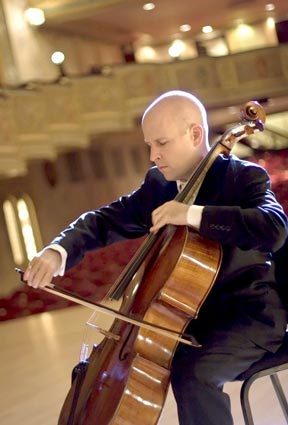By Sumi Hahn
The Seattle Times
July 17, 2009
 Cellist Robert deMaine
Cellist Robert deMaineMonday's world premiere of Christopher Theofanidis' "Summer Verses" at the Seattle Chamber Music Society Summer Festival provided all the thrills one would expect from such an event and some eyebrow-lifting moments as well.
The composer himself made an appearance during the recital. Flanked by violinist James Ehnes and cellist Robert deMaine, for whom one section was composed, Theofanidis proved a charming exponent of his music. "Music should be an extension of how you feel about life," he remarked.
Theofanidis seems to feel pretty good about life. He is one of the world's most sought-after living composers, after all, and "Summer Verses" crackled with energy as it delivered sonic textures that were quite remarkable. Without question, the extraordinary musicianship of both Ehnes and deMaine elevated the piece into a performance to remember.
The dizzying first section, "very, very happy," was thick and fuzzy, with the violin and cello fiddling away in a frenzy before dying out in a series of quiet plucks. The second section, "curious," was a cascade of bubbly pizzicati that reminded me of the sounds the Blue Man Group make on their white plastic tubes: goofy, hollow tones that made several members of the audience giggle.
The third section, "lyric, wistful," was a marvel of controlled dissonance. Ehnes and deMaine produced sounds that felt like magnetic fields distorting against each other. When, at last, the cello produced a recognizable, sustained tone, the effect was palpably electric. One could feel the vibrations in the instrument amplify across the concert hall.
The section titled "Robert," in honor of the 19-year friendship between cellist and composer, was sheersilliness. Ehnes played the straight man, repeating two notes over and over as deMaine clowned around with sound effects. He coughed, sang, marveled at his own playing, talked and made faces, all while sawing away heroically. deMaine blushed afterward, and it was impossible not to adore him for being such a good sport.
The concluding section, "noble, resolute," mesmerized with its deliberate, cacophonous transformation of a melodic line from a Bach chorale. Both cello and violin started out together on atonality that was split until it seemed to fray, much in the manner of a stick bent until it splinters apart. Near the end of the piece, deMaine's cello created husky drones that recalled Tibetan throat singers with their impossibly layered voices before both players exploded in a spray of high pitches that felt like shards of glass raining down.
And what of the rest of the evening? The opening Ravel was spooky and lovely, skipping along like a child-ghost haunting a jazz bar. Violinist Soovin Kim and pianist Adam Neiman brought restraint and verve to a piece that isn't as likable as it is sharply intelligent and interesting. The concluding Brahms' Piano Quintet inF minor, alas, was played with too much abruptness and stridency; it failed to take flight, as this propulsive piece so often does.
